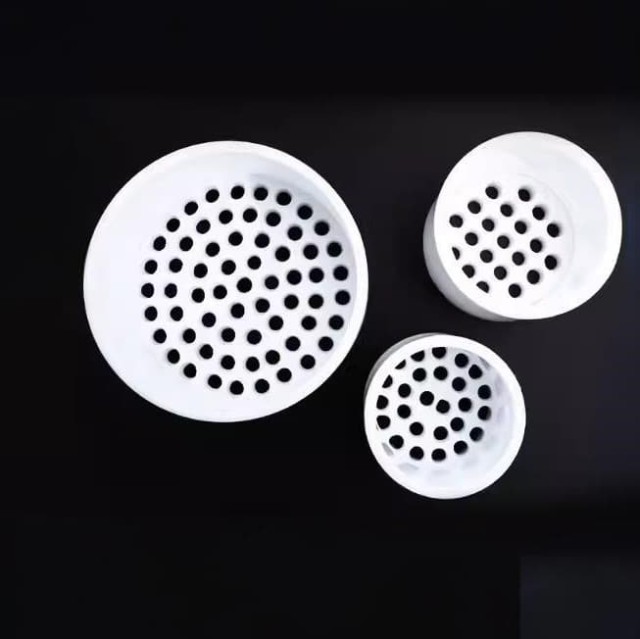
PTFE material
Custom PTFE Teflon Parts Manufacturer for PTFE Mesh F4 Sieve
Item Number : PTFE-34
Price varies based on specs and customizations
- Material
- PTFE
- Specification
- See the form
Shipping:
Contact us to get shipping details Enjoy On-time Dispatch Guarantee.
Why Choose Us
Easy ordering process, quality products, and dedicated support for your business success.
Introduction
PTFE mesh sieve, also known as F4 sieves, are particularly useful in industries where non-reactivity and resistance to high temperatures are crucial. These sieves are designed to provide precise particle size analysis while maintaining the integrity of the sample, especially in corrosive environments. Here are the main application areas of PTFE sieves:
- Pharmaceutical Industry: PTFE sieves are essential for sieving pharmaceutical powders and granules, ensuring that the particle size distribution meets strict regulatory standards. The non-reactive nature of PTFE ensures that the sieve does not contaminate the sample.
- Chemical Processing: In the chemical industry, PTFE sieves are used for the analysis and separation of chemicals where the risk of chemical reaction with the sieve material is high.
- Food and Beverage Industry: These sieves are utilized for sieving food ingredients where non-stick properties and chemical inertness are required, such as in the processing of sugar or powdered spices.
Details & Parts
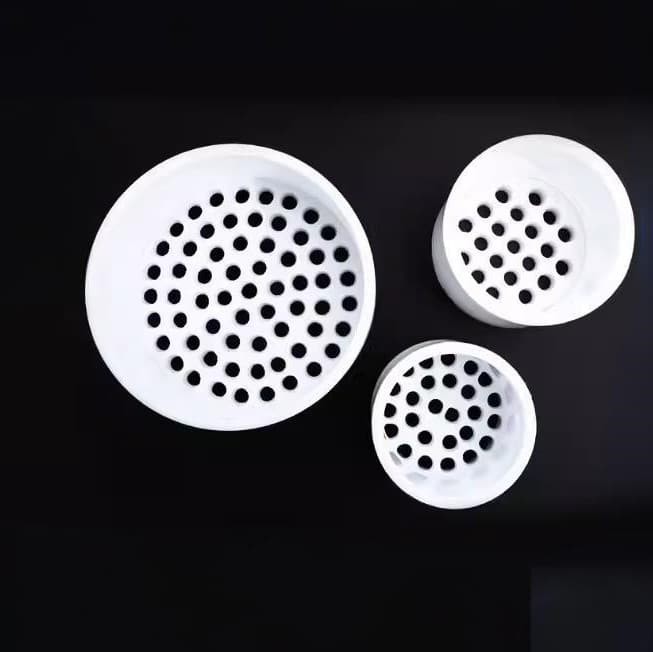
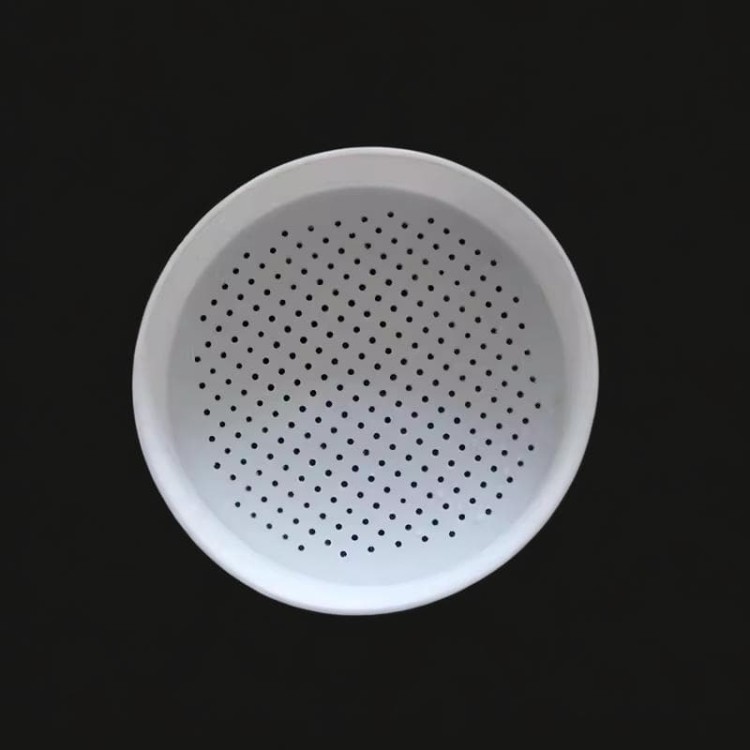
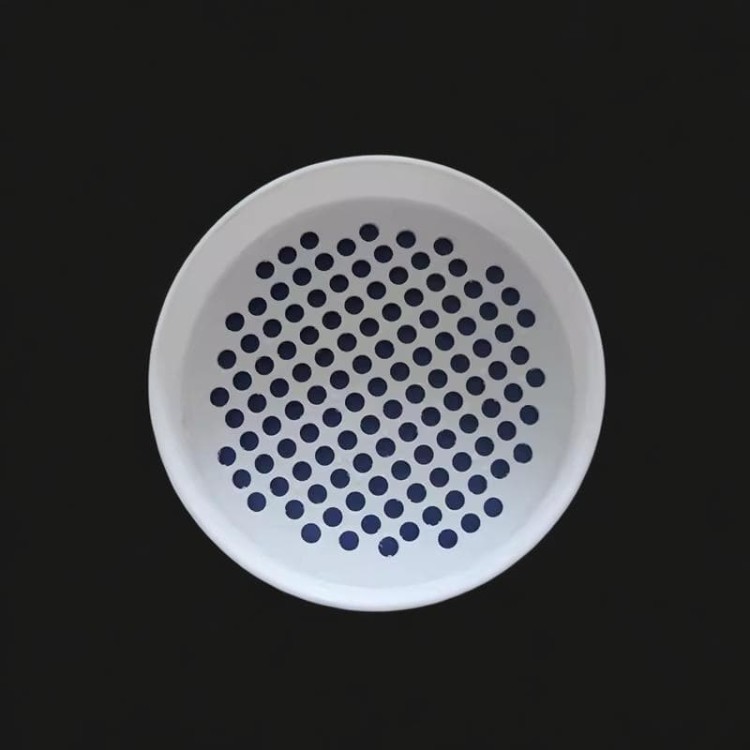
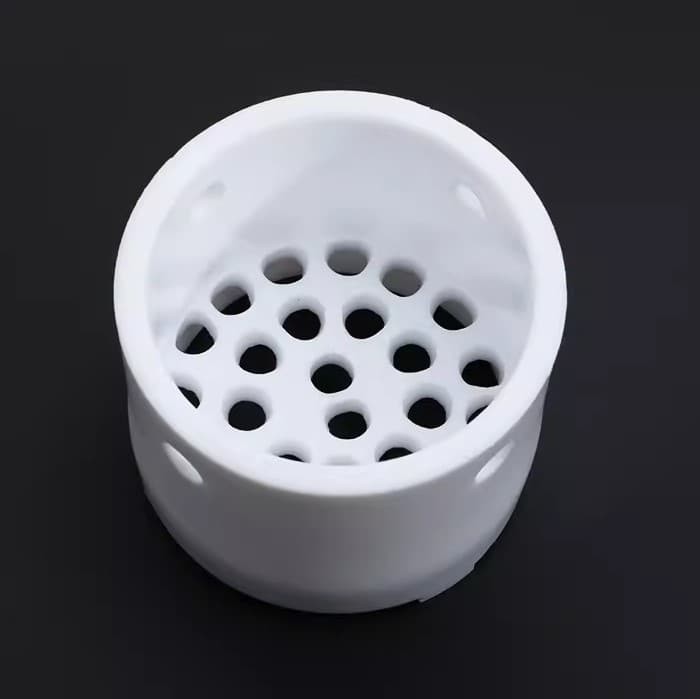
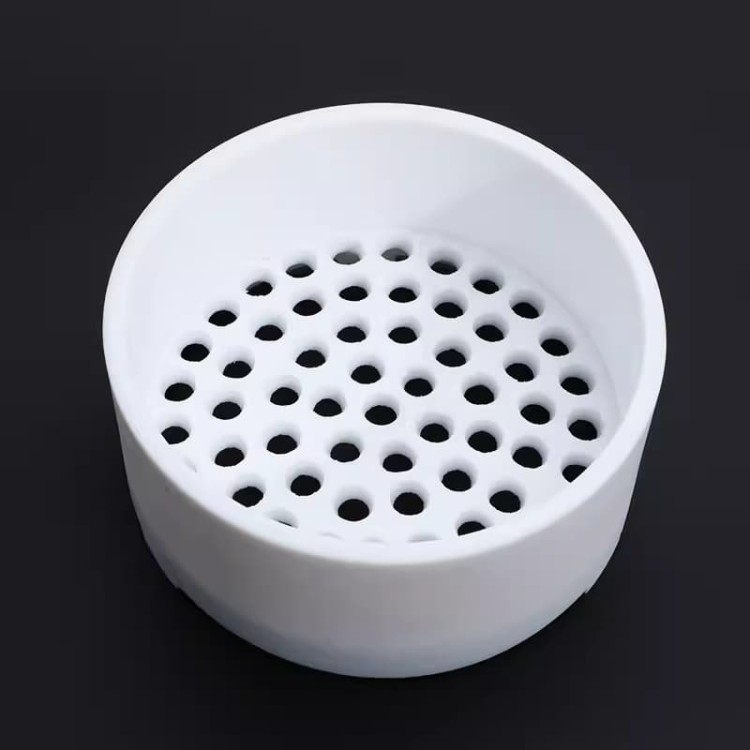
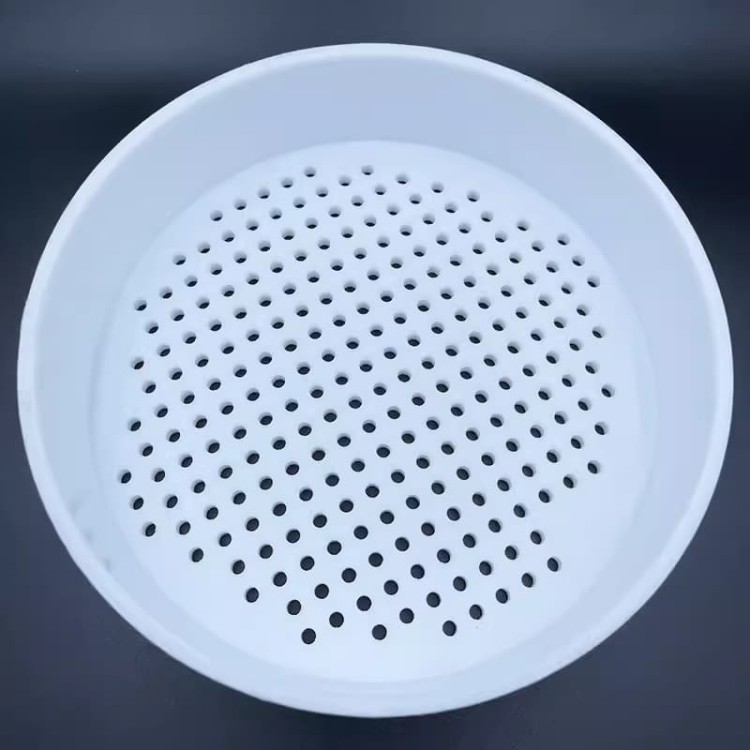

Technical specifications
| Model | Diameter/cm | Aperture/mm |
|---|---|---|
| PTFE Sieve | 20 | 0.15 |
| 20 | 1 | |
| 20 | 3 | |
| 20 | 5 | |
| 20 | 9.5 | |
| 20 | 10 | |
| 20 | 22.4 | |
| PTFE cover | 20 | 5 |
| PTFE Tray | 20 | 5 |
Advantages
The PTFE sieve, particularly when integrated into KINTEK's range of sieves, offers several distinct advantages that enhance laboratory and industrial testing processes. Here are the key benefits:
- Chemical Resistance: PTFE, or polytetrafluoroethylene, is renowned for its exceptional resistance to a wide range of chemicals. This makes PTFE sieves ideal for use in environments where exposure to corrosive substances is a concern, ensuring the integrity of the sieve and the accuracy of the results.
- High Temperature Stability: PTFE sieves can withstand high temperatures without degradation, making them suitable for applications involving heat-sensitive materials or high-temperature processes. This stability ensures that the sieve does not warp or lose its shape, maintaining precision over time.
- Non-Stick Surface: The non-stick properties of PTFE mean that materials are less likely to adhere to the sieve surface. This feature significantly reduces the risk of clogging and makes cleaning and maintenance easier, which is crucial for maintaining the efficiency and accuracy of sieving processes.
- Enhanced Durability: PTFE is a tough material that can withstand repeated use without significant wear. This durability extends the lifespan of the sieve, making it a cost-effective choice for laboratories and industries that require robust and reliable equipment.
Designed for You
KinTek provide deep custom made service and equipment to worldwide customers, our specialized teamwork and rich experienced engineers are capable to undertake the custom tailoring hardware and software equipment requirements, and help our customer to build up the exclusive and personalized equipment and solution!
Would you please drop your ideas to us, our engineers are ready for you now!
Trusted by Industry Leaders

4.8 / 5
Exceptional durability and precision.
4.7 / 5
Highly resistant to chemical exposure.
4.9 / 5
Non-stick surface greatly reduces clogging.
4.6 / 5
Excellent for high temperature applications.
4.8 / 5
Incredibly precise and accurate.
4.7 / 5
Quick delivery and easy setup.
4.9 / 5
Value for money is outstanding.
4.6 / 5
Technologically advanced and reliable.
4.8 / 5
Perfect for pharmaceutical sieving.
4.7 / 5
Sturdy and long-lasting construction.
4.9 / 5
Great for food and beverage industry.
4.6 / 5
Resistant to humidity and static.
4.8 / 5
Ideal for environmental testing.
4.7 / 5
Smooth operation and easy maintenance.
4.9 / 5
Compliant with international standards.
4.6 / 5
Enhanced durability and performance.
4.8 / 5
Non-metallic options are a game-changer.
4.7 / 5
Visual monitoring feature is very useful.
4.9 / 5
Fines retention feature ensures accuracy.
REQUEST A QUOTE
Our professional team will reply to you within one business day. Please feel free to contact us!
Related Products
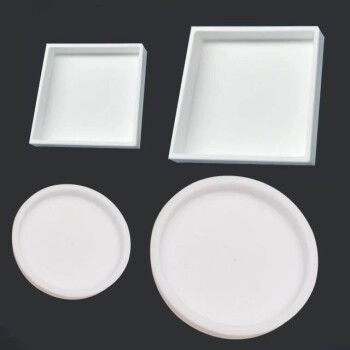
Custom PTFE Teflon Parts Manufacturer for PTFE Containers
PTFE container is a container with excellent corrosion resistance and chemical inertness.
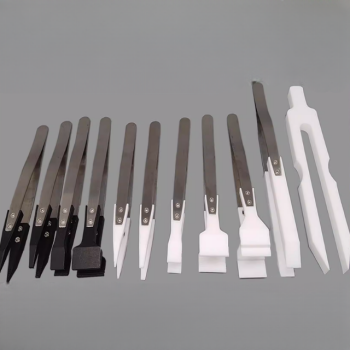
Custom PTFE Teflon Parts Manufacturer for PTFE Tweezers
PTFE tweezers inherit the excellent physical and chemical properties of PTFE, such as high temperature resistance, cold resistance, acid and alkali resistance, and corrosion resistance to most organic solvents.

Custom PTFE Teflon Parts Manufacturer for PTFE Measuring Cylinder 10/50/100ml
PTFE measuring cylinder are a rugged alternative to traditional glass cylinders. They are chemically inert over a wide temperature range (up to 260º C), have excellent corrosion resistance and maintain a low coefficient of friction, ensuring ease of use and cleaning.
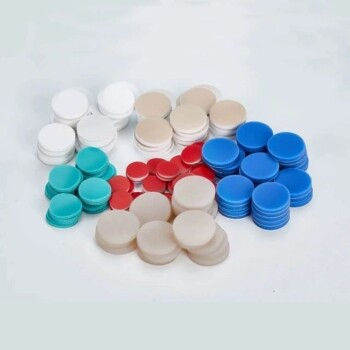
Custom PTFE Teflon Parts Manufacturer for Gaskets and More
Gaskets are materials placed between two flat surfaces to enhance the seal. To prevent fluid leakage, sealing elements are arranged between static sealing surfaces.
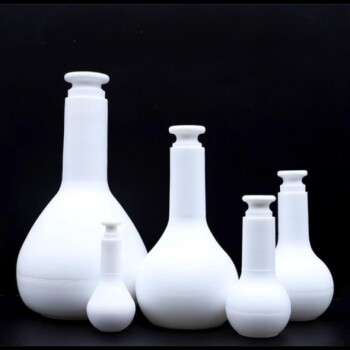
Custom PTFE Teflon Parts Manufacturer for F4 PTFE Volumetric Bottle
The PTFE Volumetric Flask, a robust alternative to glass and PP flasks, excels in measuring both acidic and alkaline liquids. Characterized by its chemical inertness, translucency, and wide volume options, this flask ensures a non-leachable, ultra-clean background. Its non-stick surface simplifies cleaning and maintenance, making it ideal for harsh laboratory conditions.
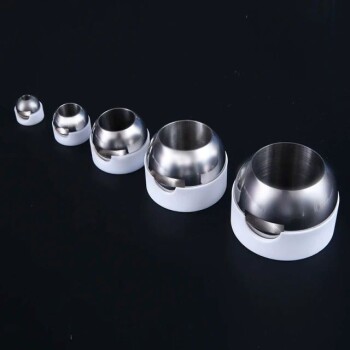
Custom PTFE Teflon Parts Manufacturer for PTFE Ball Valve Seat
Seats and inserts are vital components in the valve industry. As a key component, polytetrafluoroethylene is usually selected as the raw material.
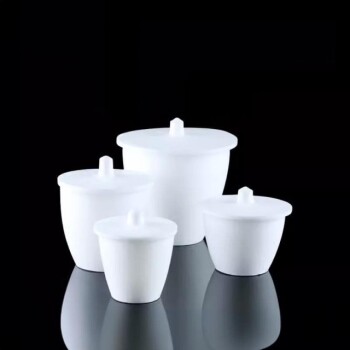
Custom Machined and Molded PTFE Teflon Parts Manufacturer with PTFE Crucible and Lid
PTFE crucibles, made from pure Teflon, offer chemical inertness and resistance from -196°C to 280°C, ensuring compatibility with a wide range of temperatures and chemicals. These crucibles feature machine-finished surfaces for easy cleaning and prevention of contamination, making them ideal for precise laboratory applications.
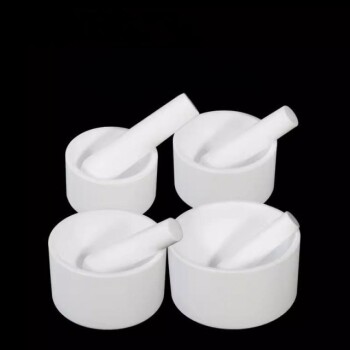
Custom PTFE Teflon Parts Manufacturer Grinding Bowl
PTFE is renowned for its exceptional chemical resistance, thermal stability, and low friction properties, making it a versatile material in various industries. The PTFE grinding bowl, specifically, finds applications where these properties are crucial.
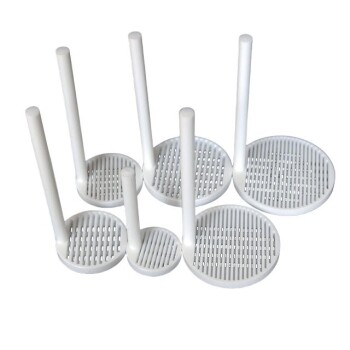
Custom PTFE Teflon Parts Manufacturer for Cleaning Racks
PTFE cleaning racks are mainly made of tetrafluoroethylene. PTFE, known as the "King of Plastics", is a polymer compound made of tetrafluoroethylene.

Custom PTFE Teflon Parts Manufacturer PTFE Beaker and Lids
The PTFE beaker is a laboratory container that is resistant to acid, alkali, high and low temperatures and is suitable for temperatures ranging from -200ºC to +250ºC. This beaker has excellent chemical stability and is widely used for heat treatment samples and volume analysis.

Custom PTFE Teflon Parts Manufacturer F4 Conical Flask Triangular Flask 50 100 250ml
The PTFE triangular flask, also known as a Teflon reagent bottle, is a robust, chemical-resistant alternative to traditional glass bottles, suitable for handling both acids and alkalis. These bottles are unbreakable, lightweight, and feature a leak-proof screw cap, making them ideal for laboratory use.
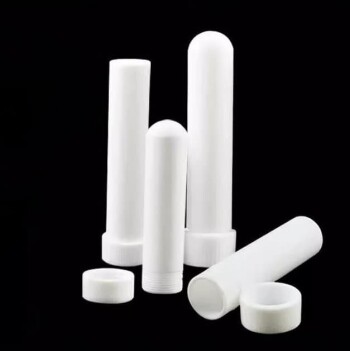
Custom PTFE Teflon Parts Manufacturer for Centrifuge Tubes
PTFE centrifugal tubes are highly valued for their exceptional chemical resistance, thermal stability, and non-stick properties, making them indispensable in various high-demand sectors. These tubes are particularly useful in environments where exposure to corrosive substances, high temperatures, or stringent cleanliness requirements are prevalent.

Custom PTFE Teflon Parts Manufacturer for Magnetic Stirring Bar
The PTFE magnetic stirring bar, made from high-quality PTFE, offers exceptional resistance to acids, alkalis, and organic solvents, coupled with high-temperature stability and low friction. Ideal for laboratory use, these stirring bars are compatible with standard flask ports, ensuring stability and safety during operations.

Custom PTFE Teflon Parts Manufacturer for Culture Dish and Evaporation Dish
The PTFE culture dish evaporating dish is a versatile laboratory tool known for its chemical resistance and high-temperature stability. PTFE, a fluoropolymer, offers exceptional non-stick properties and durability, making it ideal for various applications in research and industry, including filtration, pyrolysis, and membrane technology.

Custom PTFE Teflon Parts Manufacturer for PTFE Buchner Funnel and Triangular Funnel
The PTFE funnel is a piece of laboratory equipment used primarily for filtration processes, particularly in the separation of solid and liquid phases in a mixture. This setup allows for efficient and rapid filtration, making it indispensable in various chemical and biological applications.
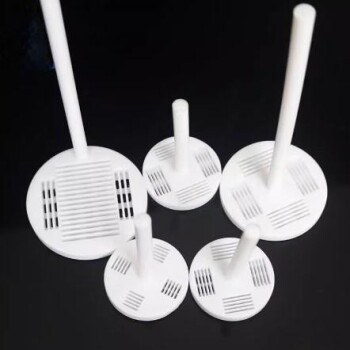
Custom Machined and Molded PTFE Teflon Parts Manufacturer for Laboratory ITO FTO Conductive Glass Cleaning Flower Basket
PTFE cleaning racks are mainly made of tetrafluoroethylene. PTFE, known as the "King of Plastics", is a polymer compound made of tetrafluoroethylene.
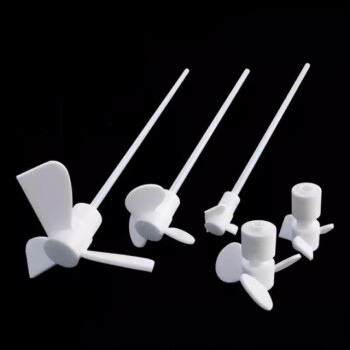
Custom PTFE Teflon Parts Manufacturer Laboratory High Temperature Mixing Paddle Mixer
The PTFE mixing paddle mixer is a versatile and robust tool designed for laboratory use, particularly in environments requiring high resistance to chemicals and extreme temperatures. Crafted from high-quality PTFE, this mixer boasts several key features that enhance its functionality and durability.
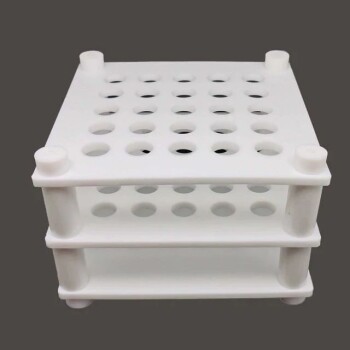
Custom PTFE Teflon Parts Manufacturer for Centrifuge Tube Racks
The precision-made PTFE test tube racks are completely inert and, due to the high temperature properties of PTFE, these test tube racks can be sterilized (autoclaved) without any problems.
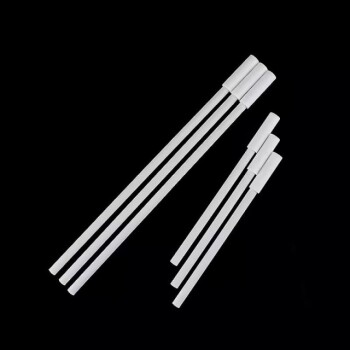
Custom PTFE Teflon Parts Manufacturer for PTFE Stirring Bar Recovery Rod
This product is used for stirrer recovery, and is resistant to high temperature, corrosion, and strong alkali, and is almost insoluble in all solvents. The product has a stainless steel rod inside and a polytetrafluoroethylene sleeve outside.
Related Articles

Exploring the Advanced Capabilities of Spark Plasma Sintering (SPS) Furnaces
Dive into the world of Spark Plasma Sintering (SPS) furnaces, their innovative technology, and applications in material science. Learn how SPS furnaces revolutionize the sintering process with high-speed, efficiency, and precision.

The key role of PTFE in semiconductor manufacturing: from gas pipelines to electrical insulation
From high-purity gas delivery pipelines to precision electrical insulation components, the multi-faceted application of PTFE in the semiconductor industry chain provides important guarantees for the purity, stability and reliability of the manufacturing process.

Innovative Application of PTFE in Mechanical Seals
PTFE has become one of the core materials in the field of mechanical seals due to its unique chemical stability, low friction coefficient (0.04-0.15), wide temperature range (-268°C to +315°C) and excellent corrosion resistance (pH 0-14).

PTFE seals: the invisible guardian of industrial leakage prevention
PTFE Seals are used to prevent liquid or gas leakage and are widely used in valves, pumps, and piping systems.

How to Select the Right Oil-Free Diaphragm Pump for Your Lab or Industrial Needs
Learn how to choose the right oil-free diaphragm pump for your lab or industry—balancing specs, chemical resistance, and lifetime costs.

How to Choose Laboratory Vacuum Pumps for Maximum Efficiency and Cost Savings
Learn how to choose the right lab vacuum pump for efficiency & cost savings. Compare oil-sealed vs. oil-free pumps & future-proof your investment.

Molecular Distillation: A Comprehensive Overview
Explains the principles and applications of molecular distillation, a technique for separating liquid mixtures based on molecular interactions and diffusion rates.

The Art of the Shutdown: Engineering Reliability in Electrochemical Cells
Post-experiment procedures are not chores; they are the foundation of future accuracy. Learn the disciplined protocol for maintaining double-layer electrolytic cells.

The Architecture of Silence: Purity in the Five-Port Cell
Preventing contamination is not just about cleaning; it is about system management. Master the protocols for glass and PTFE to ensure electrochemical precision.

The Geometry of Trust: Stabilizing the Electrochemical Cell
Data integrity begins with physical stability. Learn how to adjust your PTFE electrode stand to master gravity, eliminate vibration, and ensure reproducibility.

The Thermodynamics of a Perfect Seal: A Component-Level Approach to Sterilization
Learn why autoclaving your entire electrolytic cell destroys the seal. A guide to understanding material properties and protecting your experiments.

The Invisible Variable: Why Electrolytic Cell Hygiene Defines Data Integrity
Master the art of electrolytic cell maintenance. Discover how a strict cleaning protocol prevents cross-contamination and secures reproducible electrochemical results.